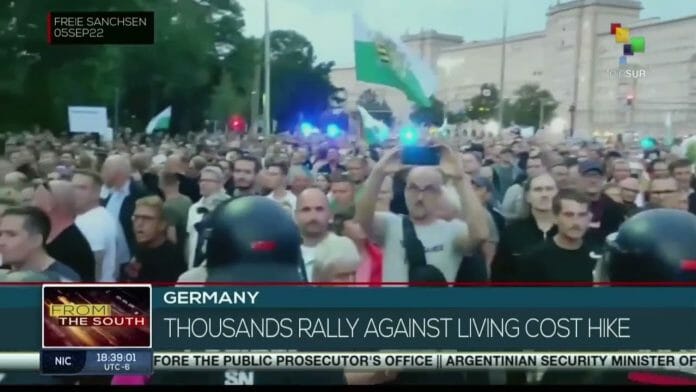Thousands of protesters gathered in the heart of Prague to demonstrate against the escalating cost of living and demanded a rapprochement with Russia which is deemed to provide access to cheaper gas supply last weekend.
Another instance of dissatisfaction was set off at the recent protests in Germany where many set fire to their electricity bills to vent off frustration on skyrocketing utility cost which are eating into their livelihoods.
It does not end there, the worsening cost-of-living crisis across Europe has already seen workers in France, Spain and Belgium, specifically from the public transport, health and aviation sectors in these nations launch strikes against higher costs and were pushing for higher wages to help them cope with inflation.
Inflationary pressures affect the poor severely, especially those people in low-income nations. These nations, mainly in southern Europe, saw their people take to the streets as they rapidly reached the limit of what they could afford.
The people, not only foresee but experience being thrown into poverty caused by rising costs, especially on essential food items, and millions continue to be driven into hardship as the citizens have to choose between “eat or heat.” What makes this situation worse in that the northern hemisphere will see colder weather soon as winter draws near.
Many economists and political analysts agree that millions of Europeans could be plunged into poverty as they are forced to choose between “food or fuel” caused by rising food and energy prices. Such inflationary pressures also put a strain on governments across Europe. In tandem, commercial businesses were reported to be suffering from higher costs due to rising
utilities bills, as smaller businesses were being forced to close down. In a bleak outlook, reports also cite the closure of steel mills, fertiliser plants and aluminium producers due to unaffordable energy bills.
A sad instance was seen when one of Germany’s most famous toilet paper producers – Hakle having to apply for insolvency proceedings in self-administration at the District Court of Düsseldorf a week ago, citing “the cost explosion because of the Ukraine war and its aftermath,” as the cause.
Henry Kissinger once said, “…he is a smart strategist.” He, here refers to Russian President Vladimir Putin. Many opined and envisaged that Putin would utilise his most powerful weapon – the control he has over commodities to indirectly cause political instability in Europe as for the long-term high dependence of these nations have on Russian gas.
So far, Europe has already spent over €300 billion on relief efforts and subsidies. The pertinent question was how much of this money could be spent to address such issues? And, how badly would a nation’s fiscal health be drained?
Europeans are continuing to pledge their support for Ukraine so the chances for mass protests remain latent.
A public survey conducted by Eurobarometer showed that 92% support humanitarian aid, 90% support providing shelter to Ukrainians who travel abroad, and 78% favour economic sanctions against the Russian elite and businesses as of July 2022.
In contrast, the opposite is true in terms of the popularity vote in Germany as it was reported that a record two thirds of the population were unhappy with the performance of Scholz and his fractious cabinet, based on a poll released last week.
Another 62% said that he was doing his job badly.
Putin’s ability to manipulate prices of major commodities means that he is likely to be able to keep prices high for the rest of the winter and so place pressure on Western political leaders. It’s important to note that Gazprom has now turned off Nord Stream 1 completely.
G7 ministers agreed last week to try to implement an oil price cap that will limit the price Russia can sell its oil for. Political analysts deem this to be “naïve.” As on retaliation, Putin said, in Vladivostok this week, that Russia will simply not sell its oil in this case.
This would inevitably take approximately 2mn bpd worth of Russian exports to Europe off the market. This is likely to cause an oil price shock that will send prices skyrocketing, adding to the present high prices for gas.
The crisis has not reached its peak. Much remains unknown but what is certain is that, if things remains as it is, economies across the EU will result in significant damage.









